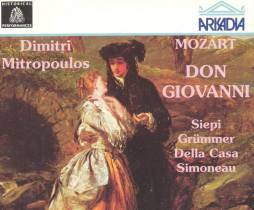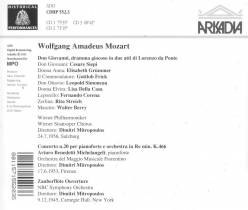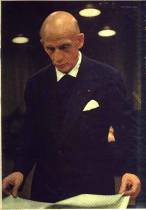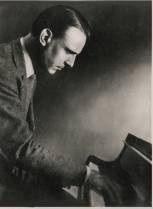 

Dimitri Mitropoulos was born near Athens on March l, 1896, to a very religious family whose home was a meeting place for many of the local Greek Orthodox heirarchy. The young Dimitri had, in fact, contemplated taking religious vows like two of his uncles, but since the Greek Orthodox liturgy did not permit the use of musical instruments, he chose music instead, a passion he could not relinquish.. He entered the Athens Conservatory where he studied piano with L. Wassenhoven and harmony and counterpoint with A. Marsick, receiving his diploma for Diano in 1918 and for composition in 1920. Also a talented composer, he wrote a symphonic poem entitled La mise au tombeau do Christ while still a student and in 1920 an opera based on a Maeterlinck text Soeur Betatrice, which was performed at the Conservatory. Mitropoulos was twenty-three when this score was shown to Camille Saint-Saens, who was very impressed. Athens offered its promising musician a scholarship for study at the Brussels Conservatory where he worked with Composer Paul Gilson from 1920 to 1921, after which he went to Berlin until 1924 to study with Busoni at the Hochschule fur Musik and where he contemporaneously worked as substitute conductor at the Staatsoper. He returned to Athens to become conductor of the Conservatory orchestra (1924-25), then of the Concert Society (1925-27), as well as director of the Conservatory itself. Together with Jean Boutnikoff (1927-29) and then alone after 1929, he conducted the Conservatory orchestra (which later became the State Orchestra), during which period he greatly influenced local public taste, introducing numerous early and contemporary compositions in his various concert programs. In 1930 he was appointed professor of composition at the Athens Conservatory and on March 6, 1933 was elected as a special member of the Athens Academy.
As a concert artist his career was greatly influenced by an event which took place in Berlin on February 27, 1930; invited to conduct Prokofiev's Piano Concerto n. 3 with the Berliner Philharmoniker, at the last moment he had to substitute for Egon Petri (also a Busoni pupil) at the piano, from where he also conducted the orchestra. His success was so overwhelming that he was immediately invited to appear throughout Europe. He repeated that performance as conductor and soloist in Paris on February 14, 1932 and two weeks later made his debut in England. In February, 1933 he made his first tour of Italy and the following year another tour of twenty-four concerts in France, Italy Belgium, Poland and Russia, concluding in May with several appearances in Leningrad and Moscow. In 1935 he was invited as guest conductor of the Orchestre des Concerts Lamoureux, on which occasion he presented several important French works. During the early Thirties he was also often engaged as conductor at Monte Carlo. After having conquered Europe it was now the turn of America to become acquainted with Mitropoulos; in January, 1936, he was presented to the American public by Serge Koussevitzky who invited him to guest conduct the Boston Symphony. The following year Eugene Ormandy retired as conductor of the Minneapolis Symphony (now the Minnesota Orchestra) and Mitropoulos replaced him as principal conductor. He moved to Minneapolis where he continued his austere and solitary way of life living in the student dormitory of the local University in a small, cellar room which contained nothing more than a day-bed, an upright piano and a few personal belongings, his only form of entertainment being the movies.
With the Minneapolis Symphony Mitropoulos also made his first recordings for Columbia Records, among then an unforgettable Mahler First Symphony, all of which served to increase the Greek maestro's popularity in the United States. In 1939 he was guest conductor of the NBC Symphony and beginning with the 1940-41 season, also of the New York Philharmonic. During the 1948-49 season he took a six-month leave of absence from Minneapolis in order to co-conduct the New York Philharmonic with Leopold Stokowski. The next year he left the Minneapolis Symphony to Antal Dorati (who had retired from the Dallas Symphony) to take on the leadership of the New York Philharmonic, the most important orchestra in the United States. His tenure in New York lasted seven years, until the 1956-57 season, when he also shared the podium with Leonard Bernstein, who was to take up full leadership in 1958. This was one of the most exciting periods in the history of the Philharmonic: among the 20th century works which Mitropoulos made a part of the permanent orchestra repertory were Berg's Wozzeck, Schoenberg's Erwartung,Choephores by Milhaud, Arlecchino, by his teacher Busoni, and the Richard Strauss Elektra. Symphonic works included many by Mahler who, in fact had conducted the New York Philharmonic during 1909. Mitropoulos at that time was at the height of his fame, and was also recipient of an honorary degree from Harvard, but his relationship with the orchestra had become increasingly difficult, always a reserved and refined gentleman in his behaviour, he lacked the temperament which had given Toscanilli, for example, so much authority over his musicians.
But when Mitropoulos left the helm of the New York Philharmonic his career took on another exiting dimension, this time ill the field of opera where he had already ventured during the early Fifties, when in Minneapolis he had conducted, albeit in concert form, Madame Butterfly, Tosca and later, with the New York Philharmonic, beside Wozzeck and Llektra, Milhaud's Cristop11e Colomb Ravel's L Heure Espagnole and Monteverdi's Orfeo. But it was in Europe that he was to enjoy his greatest success in the opera house. At the 1950 Maggio Musicale he conducted an unforgettable Elek tra with Konetzny and Modl and which he repeated at La Scala on May 26, 1954 with Cristel Goltz and Nicola Rossi Lemeni and then again at Salzburg on August 16, 1957 and in Vienna that autumn. At La Scala he also conducted [lioz~eck June 5 1952), a performance which made history because on opening night Mitropoulos was obliged to go on stage to teach what might be called a "very provincial audience" some manners. In 1953 he was again in Florence with a new Forza del Destino produced by Georg Wilhelm Pabst (Tebaldi, Protti Del Monaco, Barbieri, Siepi) and in 1954 with La Fancialla del West, Curzio Malaparte, producer (with Steber, Del Monaco, Guelfi). He made his Metropolitan debut on December 15, 1954 with Salome (Cristel Goltz) and that same year, on May 26 he returned to La Scala with Busoni's Arlecchino (Simionato, Panerai, Munteanu, Petri).
During the slightly more than five years of activity that preceeded his death Mitropoulos was increasingly more active on both sides of the Atlantic. In 1955 he conducted Un Ballo in Maschera at the Met (Tucker, Milanov, Maidera, Peters); on October 10, 1956 he conducted La Funciulla del West (Steber, Del Monaco, Gobbi) at the Chicago Lyric Opera; during the Met's 1956-57 season he conducted Eugene Onegin and on Jail uary 15 1958, the world premiere of Barber's Vanessa (Steber, Elias Resnik Gedda). During the following year, Cavalleria and Pagliacci and replicas of Boris, Cavallieri and Pagliacci. In the summer of 1956 he also conducted Don Giovanni at the Salzburg Festival ("Replica") and in the autumn, Manon Lescaut at the Vienna Staatsoper where he also returned to conduct Butterfly in 1957 and in 1958, Un Ballo in Maschera with Di Stefano. Also in 1958 at the Florence Maggio Musicale he conducted Ernani (Cerquetti, Del Monaco Bastianini, Christoff), and on October 27 he inaugurated the Met's 1958-59 season with Tosca (Tebaldi, Del Monaco). Three months later, on January 23, 1959, he suffered his first heart attack. Despite the pleas of his doctors to take a temporary break in his activities his convalescence was brief. With his usual enthusiasm he quickly resumed the rapid pace of his international career, a decision which was to prove fatal on November 2, 1960. He collapsed and died during a rehearsal of Mahler's Third Symphony at Milan's Teatro alla Scala.

Arturo Benedetti Michelangeli was born during the night of 5 to 6 January 1920 in Brescia, Italy. He began his musical training at the age of four at the "Istituto Musicale Venturi" under the direction of Paolo Chimeri. He subsequently went on to continue his musical education in Milan, where he studied piano and composition under Giovanni Anfossi as well as violin with Renzo Francesconi.
He obtained his soloist's diploma at the age of fourteen, and immediately launched his concert career. His extraordinary talent was recognized immediately and was first honoured in 1939 when Michelangeli won the first prize of the prestigious Geneva International Competition, whose jury was headed by Ignaz Paderewski. His importance as a towering figure among 20th-century pianists was stamped (coined...) by Cortot's saying:
"Here is a new Liszt".
The famous words also helped confirm his reputation abroad. He played in England in 1946, and was invited to the U.S. in 1948. In 1949, he was requested to take part in the festivities honouring (commemorating) the 100th anniversary of Chopin's death in Warsaw. In addition, Michelangeli also dedicated himself with great enthusiasm to his teaching activities. His reputation quickly spread throughout the musical world and soon led to his appointment at the Bologna Conservatory and, later, to the Conservatories of Venice and Bolzano as well. In addition, he also gave master classes in Arezzo; Siena, Turin and Lugano.
After a health-related pause in his career, he returned to the concert podium in 1964; when he travelled to Russia. The following year he toured Japan, then concertized in the U.S., lsrael and, once again, in Germany. He founded the International Piano Festival in Brescia and Bergamo in 1964, and remained its artistic director for about three years.
After setting in a town close to Lugano, in Switzerland, Michelangeli became increasingly absorbed with his search for the greatest possible depth of interpretation, the result of which can be seen in several grandiose concert performances - as concerts with orchestra and in solo recitals - which the maestro gave throughout Europe (in particular, the Vatican concerts of 1977 and 1987, as well as the Bregenz and London concert series). After overcoming an illness which broke out during a concert in Bordeaux in 1988, he returned to his international concert career with renewed energy in 1989. Its dazzling climaxes were reached in two Mozart CDs and in the exceptional Bremen concerts of 1989 and 1990, the Munich concerts conducted by Celibidache, the extensive Japan tour of 1992 and, finally, in the Hamburg concerto of 7 May 1993, which was Michelangeli's last public appearance.
Arturo Benedetti Michelangeli died in Lugano on 12th June 1995 and was buried in Pura.
Если в клетке с надписью "Лев" увидишь тигра - не верь глазам своим! В качестве бонуса к опере Моцарта Дон-Жуан под управлением Митропулоса, выпущенной фирмой Arkadia, была приложена запись концерта Моцарта. Широко известна живая запись 20-го концерта Моцарта, сделанная на концерте Микельанджели в 1989 году с оркестром Северогерманского Радио под управлением Горда Гарбена.
Данная живая запись раннего Микельанджели представляет, как мне кажется, большой интерес. Итак: Wolfgang Amadeus Mozart
Concerto No.20 per pianoforte e orchestra in Re min. K.466 01. Allegro (13:46)
02. Romance (9:40)
03. Rondo (Allegro assai) (7:29) Arturo Benedetti Michelangeli: pianoforte Orchestra del Maggio Musicale Fiorentino
Direttore: Dimitri Mitropoulos
17.6.1953, Firenze |

